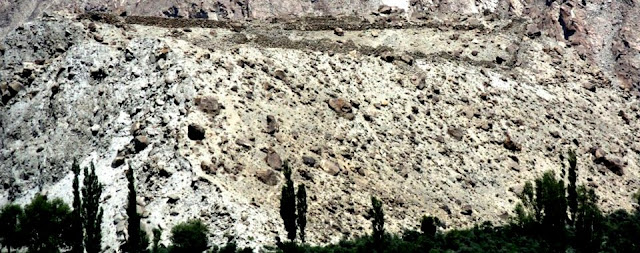Confined history of Ondra Fort (Ondra Qlaa) Gulmit Gojal
We have reached to the moon with the help of modern technologies but still we are looking for the remains of disappeared species, and human civilization still some of us are in search of their origin their history and territories, no matter how ignorant we are but we can’t forget and live without our history. During my studies I took the charge to dig some facts and figures regarding the history of Ondra Fort in specific and Gulmit in general, which was quite difficult but interesting at the same time. I am really thankful to my respondents who helped me to collect some facts and figures from the past.
 |
| Ondra Fort on top (front view) Photo credit: Zulfiqar Ali Khan |
Mir Qutlugh’s power
throne reached to Khayber (a small village after Passu) and to strengthen his
defense he constructed two gates (of mud, stones and woods). One was built at
Khyber village (used to call Khayber-Durwoza) to protect his territory from
Qirghiz (China) invaders and other at the Chamangul river side of Gulmit, to
protect his main territory form the invaders of Hunza (Kanjut) and Nager
(Nagriks) .
Unfortunately there is not enough evidence
left to witness the past but some remains of these gates and the defense wall
can still be seen at Khyber and Gulmit. As years passed and the possibilities of
threats increased he decided to build a fort with the help of locals which is
known as Ondra fort Gulmit.
There were living
quarters inside the fort, still some of the remains are crying their evidence,
The quarters in the north west side were constructed for the army of Qutlugh
(the army were included the locals only) to keep an eye on enemy movements from
that side and the southern quarters and house like were used by the soldiers to
watch the enemies from Hunza side.
 |
| Ondra Fort Gulmit Gojal Photo Credit: Zulfiqar Ali Khan |
The defense wall has
been provided with loopholes for monitoring of the area and also giving
opportunity to the defenders to fire through. The battlements of the fort are
still in evident condition but some part of the defense walls have crumbled.
Ondra fort imitates the power of Wakhi ruler Qutlugh who was never defeated by
the Mirs of Hunza nor any Qirghiz. He was famous for his chivalry and swordsman
ship. The Mirs of Hunza were scared of his rising power. They never dared to
cross the territory. Mir Qutlugh was poisoned to death by one of his elderly
female servants, which was especially on this mission sent by Mir of Hunza. She
managed to feed the poisoned food to Mir Qutlugh and his other family members.
Mir Qutlugh died after being poisoned, Gulmit was seized and Ondra Fort fell in
to the hand of Mir of Hunza. Qutlugh was buried in Gulmit along with his other
family members. According to the key respondent the grave of Mir Qutlugh was
located somewhere the newly built government girls high school.
Mir Qutlugh ruled over Gulmit and its adjoining areas for almost Twelve years. During his ruling era everything was safe and locals were happy but the invasion of Hunza Mirs totally destroyed the social setup of the area.
 |
| Ondra Fort Gulmit Photo Credit: Zulfiqar Ali Khan |
Mirs of Hunza were
brutal and their approach was inhuman towards the locals of Gojal. Mirs of
Hunza started huge tax (in good form, like wood, fruits, animals, and other
valuable things) collection by force which was absolute merciless and unjust.
Mirs of Hunza used Gulmit as headquarter during summer camp, especially to
collect tax from the locals with the help of
admirers of Mirs from Hunza and from Gojal (normally the people who were
used in accompanied during Mirs visit
were Tharampfa, Wazir, Arbob, Chorbu,
Munshee, and other family members and servants).
During their ruling era
Mirs of Hunza snatched numerous land pieces from the locals in various parts of
Gojal and they forced the locals to work for them (the locals call it Mir
Hashar). That’s why the sentiment of hatred and enmity surged in many parts of
Gojal against Mirs and their admirers, which later ended with Prime Minister
Zulfiqar Ali Bhutto’s dissolution order.
The locals left this
Fort during the ruling period of Mir Muhammad Jamal Khan Completely, because of
developed consensus and good relationship with the Mirs of Nager and Sirqolies,
later on this Fort lost its importance among the locals which led to
deterioration and demolition of this fort.

Nice effort!
ReplyDeleteThanks allot Ali bhai
ReplyDelete